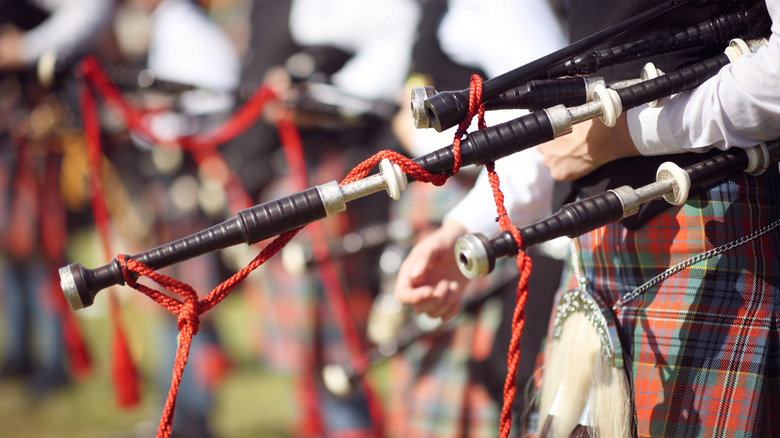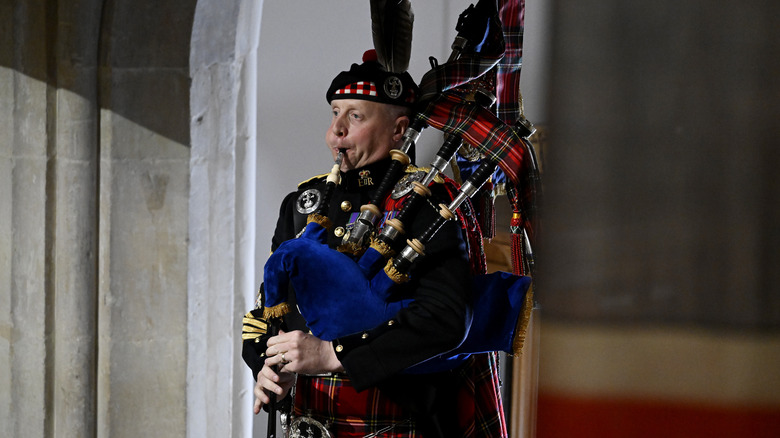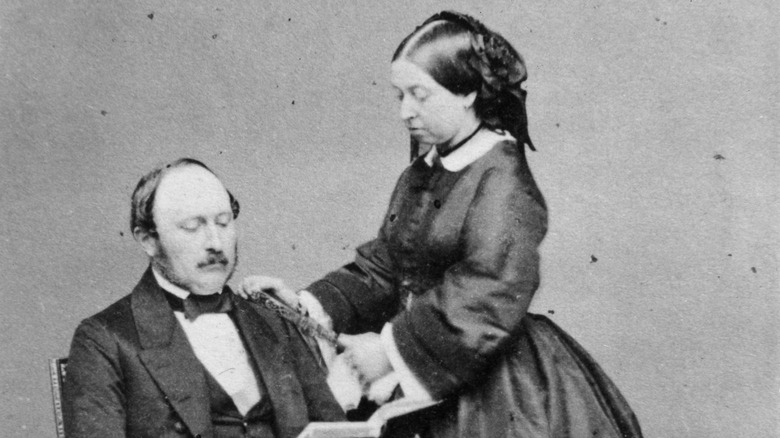The Bagpipes Played During The Queen's Funeral Have A Heartbreaking Backstory
On September 19, 2022, at 11 a.m. GMT, heads of state, members of the royal family, and those watching at home congregated at Westminster Abbey to celebrate the life of Queen Elizabeth II. Over the course of her 70-year reign, the second-longest in history, the queen remained a beloved, even maternal figure to many in the U.K. and across the world. Her funeral — which began with her lying in state at Westminster Hall and continued to Westminster Abbey before proceeding onward from there — was a truly once-in-a-lifetime, historical event for all those in attendance.
The queen was laid to rest at St. George's Chapel, the church regularly chosen by the royal family for special events, including the marriage of Prince Harry and Meghan Markle and the funeral of the late Prince Philip (via the BBC). And for a final time, bagpipes were played for Queen Elizabeth II. The lone bagpiper for the queen's final song was Pipe Major Paul Burns of The Royal Regiment of Scotland, according to The Telegraph.
CNN reports he's only held this role for one year. The U.S. Sun states that he replaced Pipe Major Richard Grisdale in 2021. Nevertheless, Major Burns is a special choice of person to play the bagpipes. He was the one who woke Queen Elizabeth II up in the morning not only on the last day of her life, but every day at Balmoral Castle. He played the bagpipe every morning under the queen's window, and now at her funeral, he played for her one last time.
One final song for the queen
Queen Elizabeth II's love of the bagpipes was well-known. As noted by Woman & Home, the queen not only encouraged others to listen to bagpipe music, insisting that it was the perfect music to wake up to, but she was also a personal patron of musical institutions like The Piobaireachd Society, a bagpipe tutoring and educational organization. When Prince William becomes king, he will apparently carry on the bagpipe tradition by waking up in the same way that Queen Elizabeth did.
The queen's personal bagpipe player is called the "Piper to the Sovereign." Any time she stayed at one of her official residences — Buckingham Palace, Holyroodhouse, Balmoral, and Windsor Castle — she woke up to 15 minutes of bagpipe playing every morning at 9 a.m. Per Women & Home, the Piper to the Sovereign didn't wake the queen up when she stayed at other residences because of a "lack of accommodation." The previous Piper to the Sovereign was Pipe Major Scott Methven, who left in 2019 after remaining in the queen's service for four years (per Marie Claire).
The queen even helped Major Methven out by watching his children one time. They stayed at Balmoral when Methven took care of his wife, who had been diagnosed with stage 4 terminal cancer. Methven later told the BBC, "She enjoyed the bagpipes, but she got to know you as a person." At her funeral on September 19, 2022, Pipe Major Paul Burns played one final song for Queen Elizabeth II: a lone piper's lament, the song "Sleep, dearie, sleep," which is often played at funerals and other solemn ceremonies (via The Telegraph).
Queen Victoria started the tradition
BuzzFeed reports that Pipe Major Paul Burns continued to play his bagpipes at the queen's committal ceremony at St. George's Chapel at Windsor Castle. He did this as the queen's coffin was placed in the royal vault. CNN adds that his bagpipes signaled the end of the funeral as he walked away from public view, causing the music to dramatically fade away. Similarly, Pipe Major Colour Sergeant Peter Grant played "Flowers of the Forest" at Prince Philip's 2021 funeral. He did this in the presence of the queen as the prince was lowered into the royal vault (per the Evening Standard).
That said, Town & Country explains that it was Queen Victoria who was the first monarch to hire a royal bagpiper. In a 1996 article in the Folk Music Journal (via JSTOR), author Neville T. Mckay writes that Queen Victoria and Prince Albert (pictured above) visited the Scottish Highlands in 1842. They stayed at Taymouth Castle, where they were presented with a ceremony that involved bagpipes. Victoria was smitten with the instrument and wrote to her mother, "We have heard nothing but bagpipes since we have been in the beautiful Highlands, and I am become so fond of it [sic], that I mean to have a Piper, who can, if you like it, pipe every night at Frogmore."
Per House & Garden, Frogmore is a royal cottage in Windsor. In 1843, Angus MacKay became the first royal bagpiper. CNN adds there has only been 17 total. According to Tatler, Victoria's admiration for the Highlands led Albert to purchase the Balmoral estate, where Queen Elizabeth II later died (per NPR).


